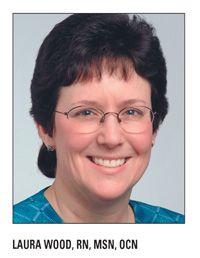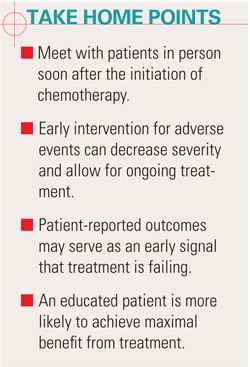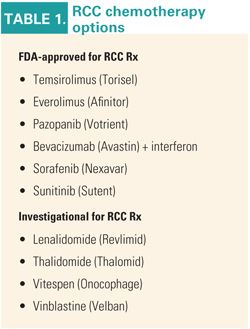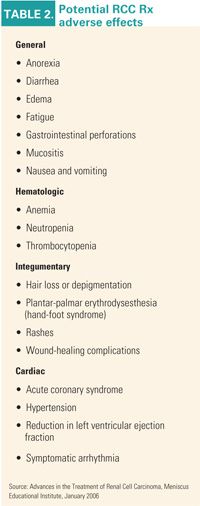RCC adverse effects and symptoms: Kidney cancer specialists must meet new challenges
Renal cell carcinoma represents 3% of all cancer cases but has a significant death rate associated with it: It’s estimated that there will be 60,000 new cases this year and 16,000 deaths from kidney cancer. The risk factors associated with kidney cancer include smoking, obesity, hypertension, and some occupational exposure.
Renal cell carcinoma represents 3% of all cancer cases but has a significant death rate associated with it: It’s estimated that there will be 60,000 new cases this year and 16,000 deaths from kidney cancer. The risk factors associated with kidney cancer include smoking, obesity, hypertension, and some occupational exposure.

Unfortunately, disease spread is more likely than not in patients with RCC, but dramatic shifts in treatment options have led to longer progression-free survival. “The challenge for those diagnosed with localized disease is that many of them will have recurrence or metastatic disease following their surgery,” said Laura Wood, RN, MSN, OCN, renal cancer research program coordinator in the Cleveland Clinic Cancer Center’s Experimental Therapeutics Program.
In seminars sponsored by Pfizer Oncology, Ms. Wood, along with other experts, highlighted key concepts in adverse event management during RCC treatment and also discussed the importance of patient-reported outcomes. The other participants were:
• Patricia Creel, RN, clinical research coordinator in the Duke Prostate Center at Duke University Medical Center in Durham, N.C.
• David Cella, PhD, associate director for cancer prevention and control at Robert H. Lurie Comprehensive Cancer Center, Northwestern University in Chicago
• William P. Bro, CEO, Kidney Cancer Association in Chicago

Treatment options
Ms. Wood pointed out the main steps for adverse event management: assessment, early intervention, and patient education. The different RCC therapies have distinct targets so adverse events can be unique to the type of treatment as well as to the patient, she said. In addition, drug combinations and dosing can influence adverse effects.
“We can give two patients the same drugs, at the same dose, and the side effects that they experience will be different,” said Ms. Wood.
Still, there is some overlap in the adverse effects associated with the major RCC treatment options-tyrokinase inhibitors, mTOR inhibitors, and vascular endothelial growth factor inhibitors-and these can be grouped into several broad categories.
“The agents...have a very distinct pattern of adverse events that become obvious in clinical trials and that we have seen over these few years,” Ms. Creel said (see Tables 1 and 2). One of the most common adverse effects is fatigue, and the speakers used this as an example of an adverse event that requires individualized management. “[This] is an adverse event that can be multifaceted depending on the patient’s perspective and how severe it is,” Ms. Wood said. “It may improve as disease-related symptoms resolve. Some of our management strategies include teaching patients how to stay active and how to maintain a normal schedule.” Rather than try to “tough it out” through fatigue, patients should be encouraged to report if they are unable to tolerate the activities of daily living.

Patient assessment and education
The speakers pointed out that early intervention is imperative. “With many of the side effects, we have early interventions that can decrease the severity and allow ongoing treatment,” Ms. Creel said. “Meeting with the patient at the beginning of treatment cycles is important. Also, it’s important to remind patients to notify their healthcare providers when they first notice adverse events.”
Patient education should ensure that the patients comprehend the treatment plan, including dosing, possible side effects, and how to manage them. During patient assessment, it’s important to keep in mind that the goal is to maintain the highest drug exposure and have the patient continue therapy so that it can be effective. Ms. Wood and Ms. Creel advocated frequent monitoring of dosing, particularly for oral therapy; assessing compliance strategy; and making sure that patients are following directions. “Very often, we can intervene with something to help the patients before we need to interrupt their dosing,” Ms. Creel said.

Also, when discussing adverse effects with patients, ask about concomitant prescription and over-the-counter medication use. “We live in a society where people add their own remedies to their therapy,” she said. “We need to know all the OTC medications that they are taking and have them feel comfortable to share that with us.”
Patient-reported outcomes
Up to 30% of RCC patients present with metastatic disease and another one-third experience recurrence after localized disease, Dr. Cella said. “More than half of [RCC] patients must contend with metastatic and incurable disease. The impact of this metastatic disease on people’s well-being is significant and varied.”
The physical and emotional impact of RCC has historically been underestimated, according to Dr. Cella. Overall survival is considered the gold standard of outcomes in clinical trials, but most trial endpoints don’t address symptom relief or improvement in function. Measuring patient-reported outcomes (PROs) can complement historical and traditional efficacy measures. “PROs have become increasingly important in cancer treatment research,” he explained. “They are an essential component to understanding of how well [patients] are going to respond to treatment and how long they will survive. They tend to correlate with how well people are doing.”

In fact, symptom patterns can be the first sign of disease progression and can be correlated with tumor response. They may serve as a harbinger that the treatment is failing. While there are many generic questionnaires available for evaluating patients, Dr. Cella recommended a more disease-specific approach. His group has developed a test called the Functional Assessment of Cancer Therapy (FACT)-Kidney Symptom Index (FKSI; see Fact Box). The 15 questions capture the most important concerns of patients with RCC and focus on symptoms specific to their disease.
“The goal is to enhance treatment decision-making; to inform practice guidelines for best management; and to evaluate baseline, follow up, and symptom management,” Dr. Cella said. “You can take these 15 questions and sum them into one score or you can take a subset and target disease-related symptoms” (see Fact box).
Kidney Cancer: The Patient's Perspective

Healthcare specialists need to keep in mind that no two patients experience RCC in the same way, Mr. Bro said.
“I recently spoke with an elderly gentleman, a fellow in his 80s, who was told by his physician that he was a good candidate for one of the new therapies for advanced disease,” said Mr. Bro, who is a kidney cancer survivor. “He wanted to tell his family that he’d reached a point in life where he didn’t care whether the disease was treated or not. Contrast that with a young woman who I spoke with, a young mother, who was absolutely panic-stricken. Her only concern was ‘Will I live long enough to be able to care for my children?’”
Varying attitudes aside, RCC patients do have many common issues to contend with beyond the physical aspects: finances, employment, disability, and end of life issues, to name a few.

Mr. Bro stressed the importance of each patient having a supportive care plan that provides the appropriate level of support. “Some patients not only feel a sense of isolation when they receive their diagnosis, they isolate themselves; they turn inward and don’t want to talk about the disease,” he said. “This inevitably leads to depression and has a profound impact on family life.”
Patients should be encouraged to talk freely with family members about their illness. Also, support groups with an educational component give patients an opportunity to discuss their common issues, he said.
Patients and family members should be encouraged to learn as much as they can about RCC so that they are in a better position to participate in treatment planning. An empowered, knowledgeable patient is more likely to stick with the therapeutic regimen even through the worst bouts of physical and emotional distress.
“There’s no doubt that, depending on how advanced the disease is, the patient may be tempted to go off therapy and, that’s not wise,” Mr. Bro said. “It’s important that patients believe that they have some control over the disease process.” In addition to learning about RCC, patients can be responsible for planning their own nutritional care or postsurgical physical therapy. Finally, patients need to think about their palliative care options.”
The issue of hospice needs to be brought up earlier rather than later, Mr. Bro advised. “If the prognosis is not good, there is no use in confronting the patient with his or her mortality immediately. But I do think it’s a useful discussion for a patient to have with family,” he said.
Vantage Point
Igor Puzanov, MD, MSCI
Structure should guide adverse events discussion
When it comes to consulting with patients about adverse effects, open-ended questions may lead to more questions than answers. Dr. Puzanov said he espouses a more targeted approach when he discusses adverse events with his patients.
“I think it’s best to ask really pointed questions and to go through the list of side effects early on in the appointment,” said Dr. Puzanov, who is associate director of phase I drug development in the melanoma/renal cancer program at Vanderbilt-Ingram Cancer Center in Nashville, Tenn. “This should be a structured discussion; it’s not about free expression at that point. Once you’ve covered the known side effects, then you can ask more open-ended questions.”
He also stressed the importance of a face-to-face discussion; otherwise patients may be tempted to hold back information. “Patients are not always forthcoming over the phone because they want to ensure that they get their treatment,” he said. “But this can lead to overtreatment from which they can develop severe side effects. That can compromise their ability to be treated altogether, not to mention their overall quality of life.”

Dr. Puzanov prefers to meet with patients in person fairly soon after the initiation of chemotherapy. “I see patients about two weeks after initiation of oral therapy to make sure that they are taking the drugs and that they have all the support they need,” explained Dr. Puzanov, who is also an assistant professor of medicine in the division of hematology-oncology at Vanderbilt University Medical Center.
At his institution, Dr. Puzanov handles the bulk of discussions with assistance from oncology nurse practitioners. In addition to the patient’s well-being, his main reason for keeping abreast of adverse events is to ensure quality of care. “The physician is responsible for knowing that the adverse events were managed appropriately and, most important, that the dose intensity of the treatment was not unnecessarily compromised,” he said.